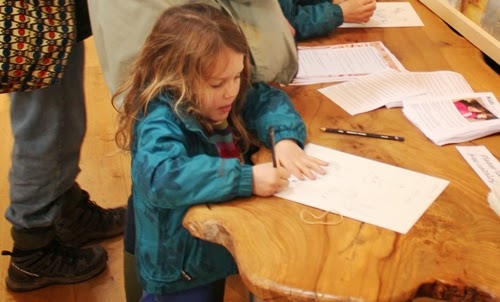I took my two daughters to the farm I grew up on in
Great Givendale and showed them the barn where cattle feed is kept. They were
fascinated at all the different types of grain stored there. I suppose they had
imagined that cows just ate grass.
In fact Lily, who is five, was so intrigued that she took
pockets full of rolled barley and sugar beet pellets into school and handed it
round to all her classmates. Her teacher was so impressed she gave Lily a
certificate! I’m lucky to be able to show my children how our food is produced.
My father was a farm manager and the feeding and rearing of cattle was what my
childhood was all about.
Organisations such as Countryside Learning, which
traditionally arranges farm visits for inner city school children, are now
running trips for children already living in the countryside too. Can you believe
that these days even rural-living youngsters are disconnected from farming too?
And I was dismayed when I read that, according to figures published
by the National Trust in 2012, only one in 10 children get the opportunity to
play in wild places.
Watching Lily and Ruby, who is just two, climbing the little
‘hillocks’ of grain and racing down them again, I realised how I took
experiences like this for granted when I was growing up. For many parents
trying to encourage their children out of the living room and into the great
outdoors has become a battleground. And it’s easy to see why. Although the benefits of going for
a walk in the countryside are obvious, it can often be a fraught time getting
the children out of the house – especially in cold weather. Just getting my two kitted up and ready to go can very
nearly send me around the bend. But once we are out we all enjoy it. I decided I would introduce my girls to an outdoor life early. Both girls have special camouflage jackets which are a great hit! I don’t take them out for long, and I never guarantee a sighting, just in case. We go out in the evenings sometimes to watch badgers at a sett close-by or drive past barn owl nest boxes to see if they are inhabited. They get very excited when they spot something.
I always take along snacks and colouring pencils and Lily can now manage to stay quiet for at least five minutes if a badger ventures out, which I think it quite good going. Both girls are gemming up nicely on their bird knowledge and can both can identify barn owls, kestrels, puffins and red kites in the field. It is important to me that my girls feel comfortable around animals. A few years ago we had a barn owl as a pet, and from about the age of one Lily would fly it about in the kitchen to the glove and we've been caring for a hedgehog over winter.
This year the National Trust has called on a number of
different organisations to reach out to children and encourage them to get in
touch with nature. I thought I would try to do my bit by offering them the
experiences that first grasped my attention as a child.
So this weekend I held a big farm event at my gallery. I’d arranged for lambs, piglets, ducklings and calves to form a mini–petting zoo in the courtyard outside the gallery. Each animal had its own little pen filled with straw and seemed completely unfazed by all the attention. Danny Cameron of Eagle Eye falconry had brought along a great display of different birds of prey including a barn owl, burrowing owl and eagle owl called Teddy. Teddy is an imposing looking bird but I was amazed how many youngsters wanted to try holding him on a glove!
There was pony rides on offer too, along with a farm quiz
around my wood, and an opportunity to dissect owl pellets that I’d collected
with my daughter Lily on the way back from the school run earlier in the week.
Anyone that could find more than 5 bones could claim a prize. It was quite a
draw - one little girl spent over half an hour sifting through one pellet!
And the children loved the chance to copy one of my original
paintings in the gallery. There was a few budding wildlife artists among them –
it can be surprising how good some can be even at a young age.Over the course of the day over 350 people turned up – so there is clearly lots of people who value an opportunity to see and learn about farm animals. Long may it continue.









No comments:
Post a Comment